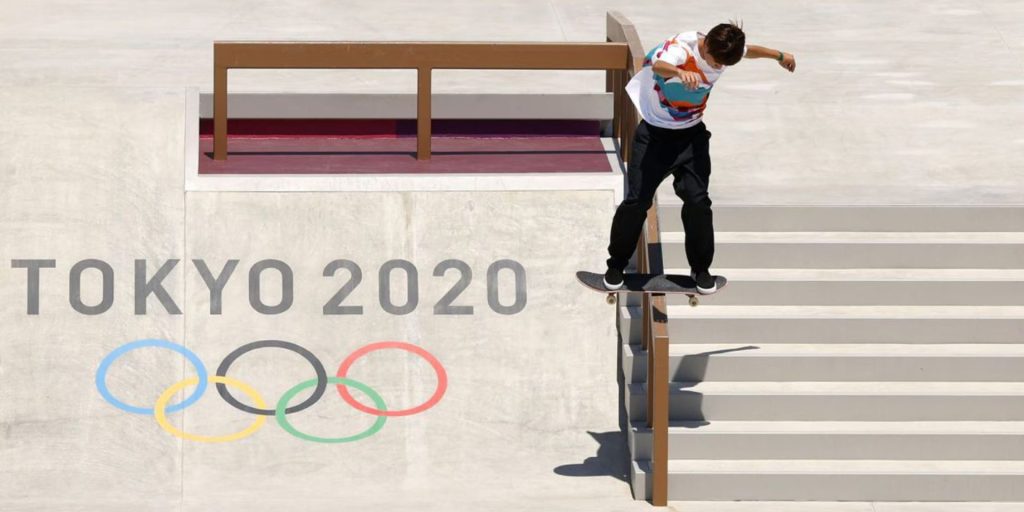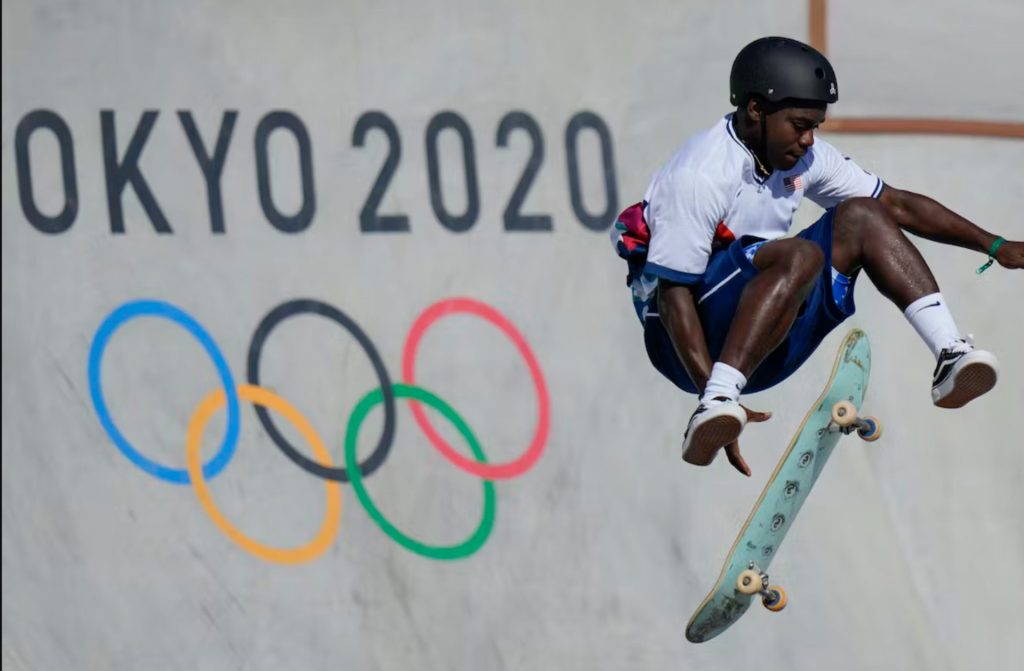There’s no denying that skateboarding has been around since the 1950s. It has been a popular recreational sport for over a century, a way for people to express themselves, take risks, get some fresh air and have fun. But when did skateboarding become an Olympic sport?
Skateboarding made its debut at the 2020 Summer Olympics in 2021 in Tokyo Japan event like a superhero skating into the spotlight! The journey to the Olympics began in August 2016 when the International Olympic Committee (IOC) accepted skateboarding as an official sport. And, it has been provisionally approved for the 2026 Summer Olympic Games.
Strap on your helmet and hit up the halfpipe – we’re about to unravel the story of how and when skateboarding became an official Olympic sport.
Want to know more about skateboarding history? Read who invented skateboard and it’s early days history.
Contents
How Skateboarding Earned Its Ticket to the Olympics
From its early street corners roots to X-Games and beyond, skateboarding has evolved significantly over the years along with its popularity. Wondering if skateboarding is a sport in the Olympics? Yes, it is now!
It wasn’t until the Rio 2016 Games that skateboarding was considered to be eligible for Olympic Games. This was due in part to lobbying efforts by organizations such as The International Olympic Committee (IOC) and The World Skate Federation (WSF).
The IOC argued that skateboarding offered an exciting new way to engage with younger generations, while WSF pushed for increased awareness of skate culture worldwide. After much debate, both sides finally agreed on adding skateboarding as an official Olympic event in 2020.
In the 2020 Tokyo Olympic Games, 80 athletes participated in the skateboarding contest, aged from 12 to 46 years. Millions of audience witnessed that outstanding show which had never seen before in an Olympic Event.
Best of all, skateboarding is not a demonstration sport in the Olympics, but rather a recreational competitive sport that has winners.
Skateboarding has evolved and traveled a long way, from normal rolling boards to different types and riding styles. Read what are the best skateboard brands these days that are making quality boards and accessories.
Making History at Tokyo 2020
Nowadays, skateboarders from all over the world are competing on some of the biggest stages imaginable—including the upcoming 2020 Tokyo Games!
This year marks a truly historic moment for skaters everywhere; not only are they getting their first chance to compete against each other on an international level, but they also have a chance to show the world just how amazing this sport can be.
With tricks like Ollies and kickflips being performed in front of millions of viewers around the globe, it’s guaranteed that the next Olympic event will be nothing short of extraordinary!
Olympic Skateboarding Rules
Skateboarding competitions in the Olympics follow similar rules as those used in traditional skateboarding contests.
The format of the event involves a combination of both individual and team events with each skater performing various tricks within a set time limit. Points are awarded for each trick based on its difficulty, execution, originality and overall performance.
The Olympic skateboarding events are judged by a team of experienced professionals who evaluate each skater’s performance on the basis of these criteria.
Skateboarding Olympics Winners till Date
Here are the names and results of the participants who took medals home in the 2020 Tokyo Olympics skateboarding event are;
| Event | Gold | Silver | Bronze |
|---|---|---|---|
| Men's Park | Keegan Palmer Australia 95.83 | Pedro Barros Brazil 86.14 | Cory Juneau United States 84.13 |
| Women's Park | Sakura Yosozumi Japan 60.09 | Kokona Hiraki Japan 59.04 | Sky Brown Great Britain 56.47 |
| Men's Street | Yuto Horigome Japan 37.18 | Kelvin Hoefler Brazil 36.15 | Jagger Eaton United States 35.35 |
| Women's Street | Momiji Nishiya Japan 15.26 | Rayssa Leal Brazil 14.64 | Funa Nakayama Japan 14.49 |
When Did Skateboarding Become Popular?
Skateboarding has been a recreational activity since the 1950s and has grown in popularity over the years. The first skateboards were made of wooden planks with roller-skate wheels attached and by 1970, they had become widely available commercially.
In the late 1970s, skateboarding experienced a huge surge in popularity as it became the new craze among teenagers. This also marked the start of skateboard competitions and events, where skaters competed to show off their skills and win prizes. This newfound popularity further propelled skateboarding’s growth in the following decades.
Wrapping Up
Skateboarding has come a long way since the 1950s. From its early beginnings as a recreational activity, it is now an official Olympic sport, thanks to lobbying efforts of organizations like the IOC and WSF. The 2020 Tokyo Olympics marked the first time skateboarders were able to compete at an international level, and it will be remembered as a historic moment for skaters everywhere.
Skaters from all over the world are competing for Olympic glory and showing off their skills to millions of viewers. We can’t wait to see what the future holds for skateboarding in the Olympics! To date, there are several Olympic skateboarding winners, and we look forward to seeing more champions emerge in the years to come.
Frequently Asked Questions
When did skateboarding begin in the Olympics?
Skateboarding was not included in any Olympic Games until the 2020 Tokyo Olympics.
Is skateboarding an official Olympic sport?
Yes, skateboarding is now an official Olympic sport.
Why did skateboarding get added to the Olympics?
Skateboarding was added to the Olympics in order to engage younger generations and spread awareness of skate culture worldwide.
When did skateboarding become a sport?
Skateboarding has been around since the 1950s as a recreational activity, but it was not considered a sport until 2016 when lobbying efforts from organizations like the IOC and WSF were successful in making it an official Olympic event.
- Best Electric Skateboard for Big Guys (Heavy Duty E-Boards) - June 3, 2023
- Skateboard Clothing Brands to Make You Stand Out In 2026 - May 31, 2023
- 90s Skateboarding Brands: The Rise and Fall of the Legends - May 28, 2023




![Skateboarding Safety Tips for Beginners and Pros [Safe Ride] skateboarding equipment list and safety tips](https://skateboardgeek.com/wp-content/uploads/2023/05/tips-for-safe-skateboarding-150x150.jpg)





![How Many Calories Does Skateboarding Burn? [Answered] does skateboarding burn more calories than walking](https://skateboardgeek.com/wp-content/uploads/2023/04/does-skateboarding-burn-more-calories-than-walking-150x150.jpg)